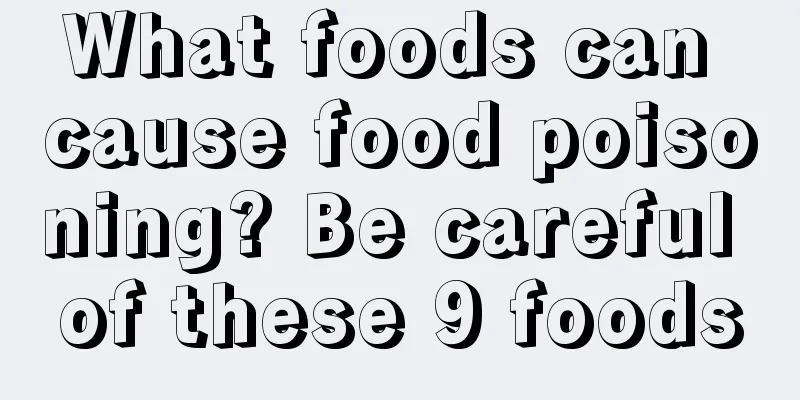What foods can cause food poisoning? Be careful of these 9 foods

|
Food poisoning is a common occurrence in daily life and seriously endangers human health. So what foods can cause food poisoning? Most people don't really understand this. In fact, there are 9 kinds of food in life that we need to be cautious when eating, and the first one is rotten cabbage. 1. Rotten Cabbage Eating rotten cabbage will cause people to lack oxygen and cause headaches, dizziness, nausea, abdominal distension, etc. In severe cases, they will have cramps, coma, and even life-threatening. 2. Moldy tea leaves Moldy tea is the result of contamination by Penicillium and Aspergillus. If you drink moldy tea water, it may cause dizziness, diarrhea, and kidney deficiency at the mildest, or necrosis of important organs at the worst. 3. Unpickled pickles If insufficient salt is added when pickling vegetables, or the pickling time is less than 8 days, it may cause nitrite poisoning. 4. Sprouted Green Potatoes The sprouts and green skin of sprouted potatoes contain high levels of solanine, which can easily cause food poisoning if consumed. Therefore, potatoes that have sprouted or have green skin should not be eaten. 5. Brown-core sugarcane Spoiled sugarcane is black or brown inside and tastes like alcohol. This is because the sugarcane is infected by Fusarium moniliforme and produces toxins. 6. Fresh broad beans Some of them can cause allergic hemolytic syndrome after eating, resulting in symptoms such as general fatigue and anemia. 7. Fresh daylily Fresh yellow flowers are extremely poisonous, but the dried ones are non-toxic. Because fresh daylily contains colchicine, this toxin can cause poisoning symptoms such as dry throat, burning sensation in the stomach, and hematuria. If you blanch the day lily in boiling water first, then soak it in cold water for more than 2 hours, changing the water once in the middle, the fresh day lily will be non-toxic. 8. Fresh Fungus Experts point out that dried fungus is safer than fresh fungus. Because fresh fungus contains a special ingredient, the chemical name is "porphyrin". Porphyrin is a photosensitive substance. When people eat fresh wood ear mushrooms and are exposed to the sun, it will cause phytophotodermatitis, which can cause skin itching, redness, swelling, itching and pain in the exposed parts of the skin. Dried black fungus is a finished product that has been exposed to the sun. Most of the porphyrins will be decomposed during the exposure process. It is then soaked in water before consumption, and the remaining toxins in it will dissolve in water, making the water-soaked dried black fungus non-toxic. It should be noted that the water needs to be changed several times when soaking dried fungus. 9. Cabbage This vegetable can be eaten raw or cooked, but vegetable farmers spray it with a lot of pesticides. If you buy it not long after it was sprayed, and you don't use the "one wash, two soak, three blanch, four fry method", then in the long run, you will easily see God. |
<<: How to prevent Aconitum poisoning
>>: What are the effects of aminophylline
Recommend
Is the Jade Flower poisonous?
Jade flower, also known as bean sprout green, is ...
How long to roast hazelnuts in microwave
In life, many people like to eat hazelnuts. Hazel...
What Chinese medicine is the most effective for toothache
Nowadays, many people are facing the situation of...
Pain under the right ribs when running
Running is a very popular sport. Many people espe...
Sacral chordoma symptoms
Sacral chordoma is a type of tumor that occurs fr...
How to choose contact lens prescription?
When I walked into the campus and looked up, I sa...
How to best preserve walnuts
Walnut is a very common food. It tastes very good...
How to treat prostate cancer? What to do if you have prostate cancer
The pathological types of prostate cancer include...
Is long-term nasal congestion a sign of nasopharyngeal cancer?
Is long-term nasal congestion a sign of nasophary...
What is the cause of osteosarcoma
The incidence of osteosarcoma is relatively low a...
Symptoms of renal impairment
Renal function damage means that the patient has ...
How to improve your emotional intelligence
People with high emotional intelligence always se...
How to treat frequent and urgent urination in the morning
In today's social life, most people are alway...
Is it good to take Chinese medicine for hamartoma
Is it good to take Chinese medicine for hamartoma...
What is the shelf life of diapers
Diapers are the most commonly used product for ba...









